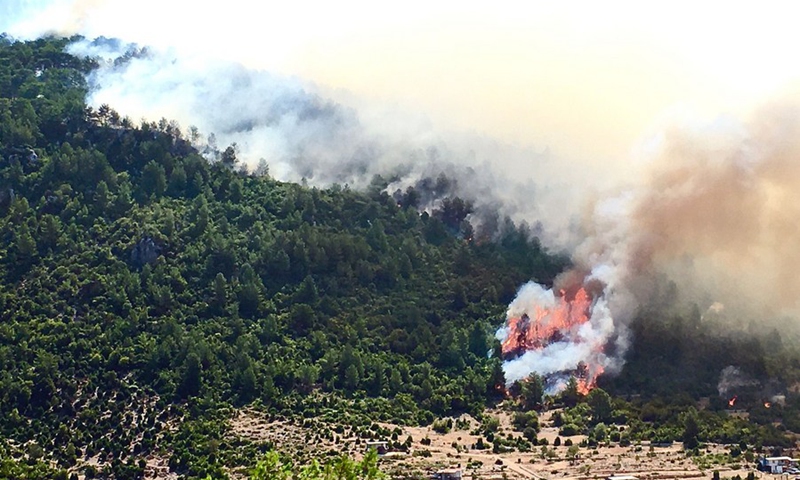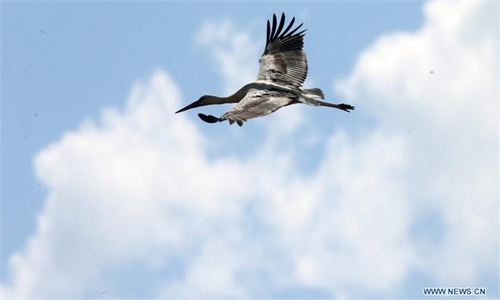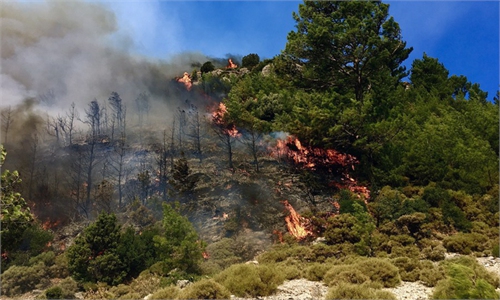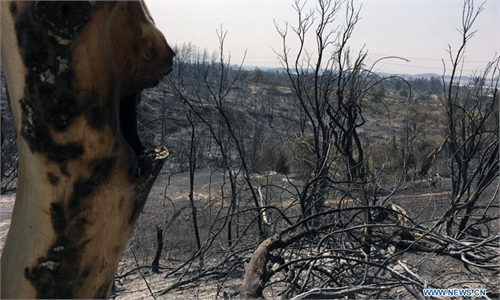EU aids Turkey as wildfire deaths hit 8
Greek officials place blame on ‘climate threat’ for dry forest conditions

A forest fire burns near the town of Manavgat, east of the resort city of Antalya, Turkey, July 31, 2021.(Photo: Xinhua)
The European Union (EU) sent help to Turkey on Monday and volunteers joined firefighters in battling a week of violent blazes that have killed eight people and put pressure on President Recep Tayyip Erdogan.Turkey's struggles against its deadliest wildfires in decades come as a blistering heat wave grips southeastern Europe creating tinderbox conditions that Greek officials blame squarely on climate change.
The fires tearing through Turkey since July 28 have destroyed huge swathes of pristine forest and forced the evacuation of panicked tourists from seaside hotels.
But they have also exposed Erdogan - facing an election in two years that could extend his rule into a third decade - to a new round of criticism over his seemingly sluggish and out-of-touch response.
The Turkish leader came under stinging condemnation for tossing bags of tea to locals while touring one of the most badly affected regions under heavy police escort.
The government's disclosure that it no longer had firefighting planes at its disposal also sparked indignation on social media and from opposition leaders.
Turkish Foreign Minister Mevlut Cavusoglu thanked Brussels on Monday for sending a water bomber from Croatia and two from Spain.
The EU said it "stands in full solidarity with Turkey at this very difficult time" - a message designed to show goodwill after more than a year of heated disputes.
Firefighters on Monday also battled local blazes on the Greek island of Rhodes and city of Patras as well as in parts of Italy and Spain. Fanned by soaring temperatures and swirling winds - with experts saying that climate change increases both the frequency and intensity of such blazes - EU data show 2021's fire season has been significantly more destructive than most.
Greek Prime Minister Kyriakos Mitsotakis said Greece is suffering under its worst heat wave since 1987.
"We are no longer talking about climate change but about a climate threat," Greek Deputy Civil Protection Minister Nikos Hardalias said.
The Turkish presidency initially blamed the fires on arsonists that pro-government media linked to outlawed Kurdish militants waging a deadly insurgency against the state.
But that theory began being abandoned as the number of fires grew and the toll mounted.
Turkish Interior Minister Suleyman Soylu said his office was investigating all options but would draw firmer conclusions once the fires were out.
"We should avoid falling into the trap of polarizing the situation," he said on a visit to one of the worst-hit coastal cities.
Turkey's forestry directorate reported more than 130 fires in dozens of towns and cities across the country in six days.
AFP



